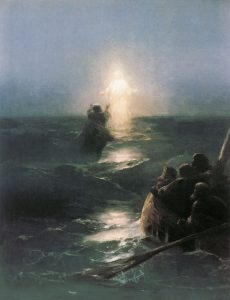In The History of the Synoptic Tradition by Rudolf Bultmann there is the following passage beginning page 236. But there’s a catch. I have not had the opportunity to track down any of the references I have cast in bold type — removing the bold as we locate them as per the comments. If you happen to be a person with an opportunity to identify any of those bolded references and point to where I can locate/read/translate them you are more than welcome to share that information in the comments section below.
There must also have been stories of walking on water in Hellenism. Admittedly it is hyperbole when Dio Chrysost. speaks of the power of Xerxes, that when he so wishes he is able πεζεύεσθαι μέν την θάλατταν, πλεϊσθαι δέ τά δρη. But the capacity to do so is often attributed to demons. P. Berol., I, 120 thus describes the power of the δαίμων πάρεδρος: πήξει δέ ποταμούς καί θάλασσα[ν συντ]όμως(?) καί οπως ένδιατρέχης (Reitzenstein, Hellenist. Wundererzaehlungen, p. 125). Also A. Dieterich, Abraxas, p. 190, 13: εγώ είμι ό έν ούρανω σχολήν έχων φοιτώμενός τε έν ύδατι, and on another tablet (Rhein. Mus., 55, 261, cp. 264): qui solus per mare transis. But according to Lucian, Philops., 13 the same things are reported of human wonder workers: είδες . . . τόν Ύπερβόρεον άνδρα πετάμενον ή έπ’ι τοϋ ϋδατος βεβηκότα. Further material may be found in A. Gercke, Jahrb. f . Philol. Suppl. X X II, 1895, pp. 205ff.; A. Abt, ‘Die Apologie des Apuleius von Madaura und die antike Zauberei’, Religionsgesch. Vers, u. Vorarb., IV, 2, 1908, pp. 129, 2. We may add from the Christian tradition: Hist. Aegypti monachorum XI, 18, p. 58; cp. XX, 16, p. 75, Preuschen; Ps. Cypr., Confess., 12.1 Indian parallels also come up for consideration in this regard, and there are stories of walking or flying over the water, which could even have influenced Hellenistic literature: cp. R. Garbe, Indien und das Christentum, 1914, pp. 57f. Most notable is a Buddhist parallel to Matt. 14 28-31 (the text is in J. Aufhauser, Jesus und Buddha, Kl. Texte, no. 157, p. 12). It tells of a disciple ‘who wanted to visit Buddha one evening and on his way found that the ferry boat was missing from the bank of the river Aciravati. In faithful trust in Buddha he stepped on to the water and went as if on dry land to the very middle of the stream. Then he came out of his contented meditation on Buddha in which he had lost himself, and saw the waves and was frightened, and his feet began to sink. But he forced himself to become wrapt in his meditation again and by its power he reached the far bank safely and reached his master.’ (Garbe, pp. 56f. and Buddhist. Maerchen, pp. 46f.) Garbe thinks that the gospel story was borrowed from the Buddhist tradition.2

1 In the language of Christian edification this miracle motif may have attained a symbolic significance and the walking on the water become the treading of the mythical waters of death, which Christ and his mystic followers achieve. Cp. Dibelius (Formgeschichte, p. 86) who adduces Od. Sol. 39: ‘He walked and went over them on foot, and his footprints stayed on the water and were not obliterated. . . . And a path was prepared for those who followed him.’ What the relation of Mand. Ginza R., II, 1, pp. 4ggf. Lidzb. is to this (Christ the seducer says, ‘I walk over the water, Come with me; you shall not drown’) can well be left undecided here.
2 Cp. W. Brown, The Indian and Christian Miracles of Walking on the Water, 1928. Saintyves, who again traces these stories to cultic origins (initiation rites) amasses a wealth of material, [P. Saintyves, Essais de Folklore Biblique, 1923], pp. 307-63. Cp. also Indianermaerchen aus Nordamerika, p. 31; Turkestan. Maerchen, p. 69; Muellenhoff, Sagen, etc., p. 351.
I did locate the reference to Brown, Indian and Christian Miracles… — it is available on archive.org – http://archive.org/details/MN40274ucmf_2
Bultmann, Rudolf Karl. 1963. The History of the Synoptic Tradition. Oxford: Basil Blackwell.
Dio Chrysostom. n.d. “Discourse 3.” LacusCurtius. Accessed March 13, 2019. http://penelope.uchicago.edu/Thayer/E/Roman/Texts/Dio_Chrysostom/Discourses/3*.html#ref11.
